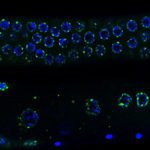Lien vers Pubmed [PMID] – 27649068
Lien DOI – 10.1111/cmi.12669
Cell Microbiol 2017 03; 19(3):
HSP90 chaperones are essential regulators of cellular function, as they ensure the appropriate conformation of multiple key client proteins. Four HSP90 isoforms were identified in the protozoan parasite Theileria annulata. Partial characterization was undertaken for three and localization confirmed for cytoplasmic (TA12105), endoplasmic reticulum (TA06470), and apicoplast (TA10720) forms. ATPase activity and binding to the HSP90 inhibitor geldanamycin were demonstrated for recombinant TA12105, and all three native forms could be isolated to varying extents by binding to geldanamycin beads. Because it is essential, HSP90 is considered a potential therapeutic drug target. Resistance to the only specific Theileriacidal drug is increasing, and one challenge for design of drugs that target the parasite is to limit the effect on the host. An in vitro cell culture system that allows comparison between uninfected bovine cells and the T. annulata-infected counterpart was utilized to test the effects of geldanamycin and the derivative 17-AAG. T. annulata-infected cells had greater tolerance to geldanamycin than uninfected cells yet exhibited significantly more sensitivity to 17-AAG. These findings suggest that parasite HSP90 isoform(s) can alter the drug sensitivity of infected host cells and that members of the Theileria HSP90 family are potential targets worthy of further investigation.

